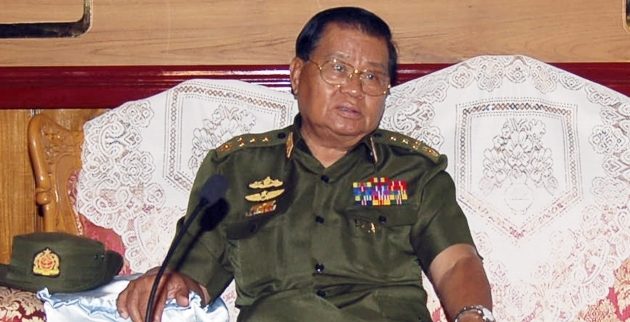As conflict builds in Burma’s north, ethnic Karen leader Gen Saw Mutu Say Poe’s meetings with big shots in Naypyidaw suggests that the Burmese hope to strengthen the country’s fragile peace process with the Karen National Union (KNU)—a once powerful ethnic organization in the southeast.
Elusive former regime leader Snr-Gen Than Shwe reportedly met the top Karen leader in his residence in mid-November but, according to sources who witnessed the meeting, they did not discuss politics.
Gen Saw Mutu Say Poe, now in his early 80s, was taken to meet Than Shwe in Naypyidaw, where he held series of meetings with current Burma Army chief Snr-Gen Min Aung Hlaing and ex-Speaker of the Lower House U Shwe Mann.
In September, Than Shwe also met a high-level Chinese delegation in his home—a move that surprised many—but political pundits say that after nearly 20 years as Burma’s military chief, his influence on the armed forces should not be underestimated.
The Karen delegation came to Naypyidaw as infighting reached a climax between Karen leaders within the movement. One faction, led by Naw Zipporah Sein—the vice chairwoman of the KNU—and another, by chairman Gen Saw Mutu Say Poe, are at loggerheads.
Due to internal conflict, the KNU postponed its annual Congress until March 2017. Sources believe that the KNU chairman and his followers are afraid that Naw Zipporah Sein and her faction will come into power in the organization’s next election.
The divisions between leaders of the organization—which is engaged in Burma’s longest-running ethnic struggle—have long been an open secret. They were magnified when top leaders decided to sign a bilateral ceasefire agreement with the previous military-backed government in January 2012.
Afterward, cracks in the unity of the leadership became visible. In October 2012, a faction led by Naw Zipporah Sein declared that they had dismissed KNU leaders such as Gen Saw Mutu Say Poe, the late Padoh Saw David Taw, and Maj Saw Roger Khin for repeatedly violating the organization’s protocol. But, the attempted purge was unsuccessful.
In November and December 2012, the KNU held its 15th Congress and those leaders who had been dismissed came to power. Saw Mutu Say Poe was elected chairman of the organization and Gen Saw Johnny became the chief of the KNU’s military wing, the Karen National Liberation Army (KNLA).
After Saw Mutu Say Poe came to power, it is believed that his colleagues in the upper echelons of the KNU had little respect for or contact with the faction led by Naw Zipporah Sein.
Meanwhile, Saw Mutu Say Poe’s faction repeatedly visited Naypyidaw, meeting with ex-President Thein Sein and Burma Army chief Snr-Gen Min Aung Hlaing, as recently as mid-November. Little information was reportedly shared about those visits with Naw Zipporah Sein’s allies within the KNU.
Sources in Naypyidaw speculate that Min Aung Hlaing wants the KNU leaders to act as a go-between in talks with State Counselor Daw Aung San Suu Kyi. Relations between Daw Aung San Suu Kyi and Min Aung Hlaing have reportedly grown strained. No meeting has taken place between the State Counselor and the Karen leaders in recent days, but in the past, they met on several occasions.
According to a Facebook post by Snr-Gen Min Aung Hlaing, the KNU leaders and the Burma Army representatives talked about holding another peace conference, about national-level political dialogue, and potential troop repositioning in KNU territories. No further elaboration was reported.
Ethnic observers believe that the Burma Army will support and legitimize the role of the KNU leaders in the peace process and showcase the KNU as a positive example of participation when holding a future peace conference. As other major ethnic armed groups, including the Kachin Independence Army (KIA), engage in war with the Burmese forces in northern Shan State, the KNU will serve as a “trophy fish” that the military can show off, said the observers.
There has been intermittent tension over the years between ethnic Karen and Kachin leaders. When the Kachin opted to sign a ceasefire with the Burma Army in 1994, the Karen and other ethnic groups remained engaged in armed struggle. The Kachin ceasefire broke down in 2011, and fighting resumed between the KIA and Burmese forces. Ironically, from 2011 onward, the KNU then moved closer to the government and military in Burma.
Reliable sources within the KNU said that the organization’s top leaders are against the idea of releasing a statement on the ongoing fighting in northern Shan State, which has displaced thousands. Other KNU figures are reportedly unhappy with the top leaders’ silence on the issue, and with seemingly closer ties being fostered with the Burma Army while fighting between the ethnic Northern Alliance—of Ta’ang, Kokang, Kachin and Arakanese forces—flares up in Shan State.
The same sources also say that the Burma Army also might have concerns about the rise of Naw Zipporah Sein’s faction within the KNU, fearing that under her leadership, the organization would approach the peace process much more skeptically and with greater caution, making future negotiations more challenging from the Tatmadaw’s perspective.
Thus, the Burma Army has deepened its relationship with current KNU leaders by allowing them to visit retired general Than Shwe who likely still holds some sort of power in military matters.
Saw Mutu Say Poe’s meeting with Than Shwe is arguably the second most significant event in Karen-Burma relations since the late KNU chairman Gen Saw Bo Mya met Gen Khin Nyunt in 2004.
















